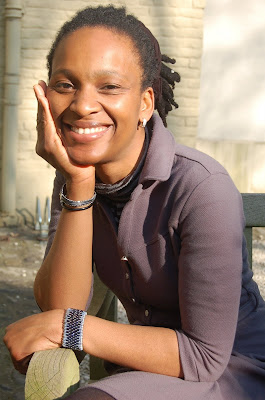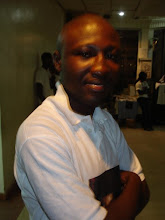On daily basis, there is a mass exodus of Nigerians to America, Europe and even to some African countries like Ghana, South Africa, Benin Republic, Cameroon and Niger. But they hardly go to Iraq, Israel, or Palestine, don't ask me why. But why do they migrate to UK, US, SA or even Ghana? Even a little child wouldn’t waste much time before providing the answer- “G is for greener pasture!” the child would say. Many of these immigrants believe that when they get to these countries, their sufferings would be over; that they can marry the girl of their dream, cruise in exotic cars of their choice an d live in the
d live in the  luxurious house of their dream. But many on getting there suddenly discover that America and Europe are more promising and habitable on television screen than in real life!
luxurious house of their dream. But many on getting there suddenly discover that America and Europe are more promising and habitable on television screen than in real life!  There’s economic tsunami everywhere! But body and soul must be kept together, dollars or pounds must be sent home and bills must be paid. Pressure gets to an all time high; hunger gets unbearable while fear of being deported becomes a nightmare. “I must make it”, the Nigerian assures himself or herself. How? Through prostitution, gang
There’s economic tsunami everywhere! But body and soul must be kept together, dollars or pounds must be sent home and bills must be paid. Pressure gets to an all time high; hunger gets unbearable while fear of being deported becomes a nightmare. “I must make it”, the Nigerian assures himself or herself. How? Through prostitution, gang sterism, Yahoo-Yahoo (cyber-fraud), armed-robbery or what? Three authors tell compelling stories about these crimes from different perspectives.
sterism, Yahoo-Yahoo (cyber-fraud), armed-robbery or what? Three authors tell compelling stories about these crimes from different perspectives.
Untangling those things around your neck:
What are those things? “The Thing Around Your Neck” is the most recent book from Chimamanda Ngozi Adichie the author of “Purple Hibiscus” and “Half of a Yellow Sun.” “The Thing Around Your Neck” is a collection of nine dazzling short stories that focus on the problems associated with arranged marriage, the trouble of securing American visa and the horror of war among others. The various issues explored by the author are not just around our necks but have built tents around us that we can no longer move our entire body. Fire on Adichie!
A Cruise through the Black Sisters’ Street:
As you get set to journey through the Black Sisters’ Street, what do you expect to see? Is it going to be a street full of luscious cars and elegant edifices? The answer is far from that. “Black Sisters’ Street” is a fortunate or unfortunate story of four African ladies who work as prostitutes. One of them dies but would her death be a lesson to those living? Would the other three rekindle their dreams and retrace their steps after the death of a colleague? The answer would be provided when you cruise through the “Black Sisters’ Street.”
One of them dies but would her death be a lesson to those living? Would the other three rekindle their dreams and retrace their steps after the death of a colleague? The answer would be provided when you cruise through the “Black Sisters’ Street.”
Chika Unigwe, the author of “Black Sisters’ Street” is an award-winning Nigerian author based in Belgium. Her debut “De Finiks” mirrors the problems immigrants face in their quest to make ends meet in an unfamiliar environment.
I’m not a 419er by Chance:
Kingsley Onyeaghananwanneya (what a long name) was made to believe from childhood that acquiring good certificates is a ticket to success in life. But upon graduation, the only job available was from “Cash Daddy” who owns Central Intelligence Agency (CIA), an agency that specializes in 419. The book reflects the twists and turns of life and shows how the road to success often swelters with these vicissitudes. In most cases, cutting corners the writer argues, can even be more challenging than going through the approved and accepted routes. The question is: which is the approved route to success? Kingsley Onyeaghananwanneya just like many people takes to this precarious occupation. Can he eat his cake and have it?
agency that specializes in 419. The book reflects the twists and turns of life and shows how the road to success often swelters with these vicissitudes. In most cases, cutting corners the writer argues, can even be more challenging than going through the approved and accepted routes. The question is: which is the approved route to success? Kingsley Onyeaghananwanneya just like many people takes to this precarious occupation. Can he eat his cake and have it?
“I Do Not Come To You By Chance” is a mature book written by Adaobi Tricia Nwaubani. Though her debut, it is nevertheless, an interesting read.
What I Say: “The Thing Around Your Neck”, “Black Sisters’ Street” and “I Do Not Come To You By Chance” are displays of literary intelligence from three Nigerian writers. In terms of theme, the three books are interwoven either directly or indirectly, covertly or overtly. Good books to add to your shelf!
 d live in the
d live in the  luxurious house of their dream. But many on getting there suddenly discover that America and Europe are more promising and habitable on television screen than in real life!
luxurious house of their dream. But many on getting there suddenly discover that America and Europe are more promising and habitable on television screen than in real life!  There’s economic tsunami everywhere! But body and soul must be kept together, dollars or pounds must be sent home and bills must be paid. Pressure gets to an all time high; hunger gets unbearable while fear of being deported becomes a nightmare. “I must make it”, the Nigerian assures himself or herself. How? Through prostitution, gang
There’s economic tsunami everywhere! But body and soul must be kept together, dollars or pounds must be sent home and bills must be paid. Pressure gets to an all time high; hunger gets unbearable while fear of being deported becomes a nightmare. “I must make it”, the Nigerian assures himself or herself. How? Through prostitution, gang sterism, Yahoo-Yahoo (cyber-fraud), armed-robbery or what? Three authors tell compelling stories about these crimes from different perspectives.
sterism, Yahoo-Yahoo (cyber-fraud), armed-robbery or what? Three authors tell compelling stories about these crimes from different perspectives.Untangling those things around your neck:
What are those things? “The Thing Around Your Neck” is the most recent book from Chimamanda Ngozi Adichie the author of “Purple Hibiscus” and “Half of a Yellow Sun.” “The Thing Around Your Neck” is a collection of nine dazzling short stories that focus on the problems associated with arranged marriage, the trouble of securing American visa and the horror of war among others. The various issues explored by the author are not just around our necks but have built tents around us that we can no longer move our entire body. Fire on Adichie!
A Cruise through the Black Sisters’ Street:
As you get set to journey through the Black Sisters’ Street, what do you expect to see? Is it going to be a street full of luscious cars and elegant edifices? The answer is far from that. “Black Sisters’ Street” is a fortunate or unfortunate story of four African ladies who work as prostitutes.
 One of them dies but would her death be a lesson to those living? Would the other three rekindle their dreams and retrace their steps after the death of a colleague? The answer would be provided when you cruise through the “Black Sisters’ Street.”
One of them dies but would her death be a lesson to those living? Would the other three rekindle their dreams and retrace their steps after the death of a colleague? The answer would be provided when you cruise through the “Black Sisters’ Street.”Chika Unigwe, the author of “Black Sisters’ Street” is an award-winning Nigerian author based in Belgium. Her debut “De Finiks” mirrors the problems immigrants face in their quest to make ends meet in an unfamiliar environment.
I’m not a 419er by Chance:
Kingsley Onyeaghananwanneya (what a long name) was made to believe from childhood that acquiring good certificates is a ticket to success in life. But upon graduation, the only job available was from “Cash Daddy” who owns Central Intelligence Agency (CIA), an
 agency that specializes in 419. The book reflects the twists and turns of life and shows how the road to success often swelters with these vicissitudes. In most cases, cutting corners the writer argues, can even be more challenging than going through the approved and accepted routes. The question is: which is the approved route to success? Kingsley Onyeaghananwanneya just like many people takes to this precarious occupation. Can he eat his cake and have it?
agency that specializes in 419. The book reflects the twists and turns of life and shows how the road to success often swelters with these vicissitudes. In most cases, cutting corners the writer argues, can even be more challenging than going through the approved and accepted routes. The question is: which is the approved route to success? Kingsley Onyeaghananwanneya just like many people takes to this precarious occupation. Can he eat his cake and have it?“I Do Not Come To You By Chance” is a mature book written by Adaobi Tricia Nwaubani. Though her debut, it is nevertheless, an interesting read.
What I Say: “The Thing Around Your Neck”, “Black Sisters’ Street” and “I Do Not Come To You By Chance” are displays of literary intelligence from three Nigerian writers. In terms of theme, the three books are interwoven either directly or indirectly, covertly or overtly. Good books to add to your shelf!
Pictures: (From Up: Adaobi Tricia Nwaubani, Chimamanda Adichie, and Chika Unigwe.








 his 50th birthday and 25th Anniversary since graduation from the prestigious Yaba School of Printing and Graphic Arts. Mr. Adeyemi’s exhibits are deeply rooted in the tradition, especially the traditions of the Yoruba people while his combination of abstract and realism genuinely brings out the beauty of his works and a time, makes the work interestingly complex. Enjoy this brief and short interview with Prince Kunle Adeyemi. Exerpt:
his 50th birthday and 25th Anniversary since graduation from the prestigious Yaba School of Printing and Graphic Arts. Mr. Adeyemi’s exhibits are deeply rooted in the tradition, especially the traditions of the Yoruba people while his combination of abstract and realism genuinely brings out the beauty of his works and a time, makes the work interestingly complex. Enjoy this brief and short interview with Prince Kunle Adeyemi. Exerpt:

























